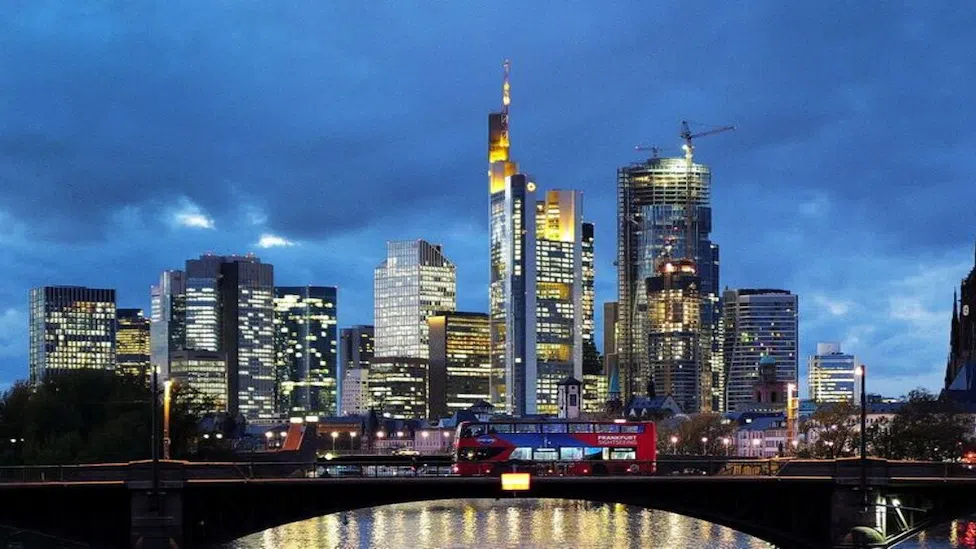German Economic Growth 2025: German economic growth 2025 surprised analysts with a sharp rise in the first quarter. The Federal Statistics Office reported a 0.4% GDP increase from the previous quarter, doubling the earlier estimate of 0.2%. This growth followed a 0.2% contraction in late 2024, which had sparked fears of a recession.
The rise was mainly due to stronger exports and increased manufacturing activity ahead of expected U.S. tariffs. Germany, Europe’s largest economy, outperformed the eurozone average. Experts now question whether this momentum can carry forward in the coming months.
Also Read | Israeli Embassy Staff Shooting Near DC Jewish Museum Ignites Global Outrage
German Economic Growth 2025: Insights
- German economic growth in 2025 rose 0.4% in Q1, revising the earlier 0.2% estimate.
- Exporters sped up shipments before potential U.S. tariffs.
- Manufacturing and trade were the main drivers of growth.
- Q1 growth beat the eurozone average of 0.3%.
- Household consumption rose 0.5%, stronger than in previous quarters.
- Investment increased by 0.9% compared to Q4 2024.
- Government spending dropped by 0.3% due to a provisional budget.
- Economists say a cyclical rebound in manufacturing is underway.
- Analysts remain cautious about continued momentum into Q2.
- A €500 billion infrastructure fund offers long-term optimism.
Background
Germany’s economy had been under strain following a 0.2% decline in Q4 2024. That drop reignited worries about a possible recession, trade tension with the U.S. and delays in approving the national budget added pressure. In March, the government passed a €500 billion infrastructure fund to support long-term growth.
Until then, a provisional budget has limited public spending. However, rising wages and lower inflation had set the stage for stronger consumption, these mixed conditions shaped early expectations for German economic growth 2025, which have now been surpassed.
Main Event
In its second estimate, the Federal Statistics Office confirmed that German economic growth 2025 was stronger than initially thought. The GDP rose by 0.4% in Q1, compared to the earlier 0.2% figure. This performance followed a weak Q4 in 2024 when the economy shrank by 0.2%.
Exports and manufacturing drove the improved numbers. Many U.S. importers rushed orders before potential tariff hikes, pushing German exports up by 3.2%. Manufacturing also grew faster than expected. Ruth Brand, head of the statistics office, explained that both sectors outperformed earlier forecasts.
Household consumption added to the growth, rising by 0.5%, a result of increasing real wages. Investment also jumped 0.9%, showing renewed confidence in the market. However, government spending dropped 0.3% due to delays in passing the 2025 budget.
Cyrus de la Rubia of Hamburg Commercial Bank said the export surge was likely temporary. He also noted signs of a broader recovery in manufacturing. ING’s Carsten Brzeski called the Q1 data a rare upside surprise but warned that future growth might slow again. Still, he pointed to the €500 billion infrastructure plan as a sign of longer-term support.
Overall, the results show a sudden burst of strength for Germany’s economy in early 2025. Whether this can be repeated remains uncertain.

A close-up of the German flag’s black, red, and gold stripes, reflecting the country’s surprise economic upswing in early 2025.
Photo Credits: Unsplash.
Also Read | AI Talent War Heats Up as Tech Giants Compete for Superstar Researchers
Implications
The Q1 boost in German economic growth 2025 offers hope, but challenges remain. Businesses saw short-term gains from frontloaded exports, though this spike may not last. Households also spent more, thanks to rising wages. Yet, government spending limits due to a temporary budget could reduce future public investment.
For now, the economy has avoided recession. Long-term growth may depend on the rollout of the infrastructure fund and sustained recovery in manufacturing. Investors and policymakers will closely watch Q2 data to assess lasting trends.
Conclusion
German economic growth 2025 has made a strong start with Q1 gains led by trade and consumption. Analysts warn that this momentum may not hold, especially as temporary factors fade. However, with improving wages and a major infrastructure fund in place, there is cautious optimism.
The next few months will be key in shaping Germany’s economic path forward.



